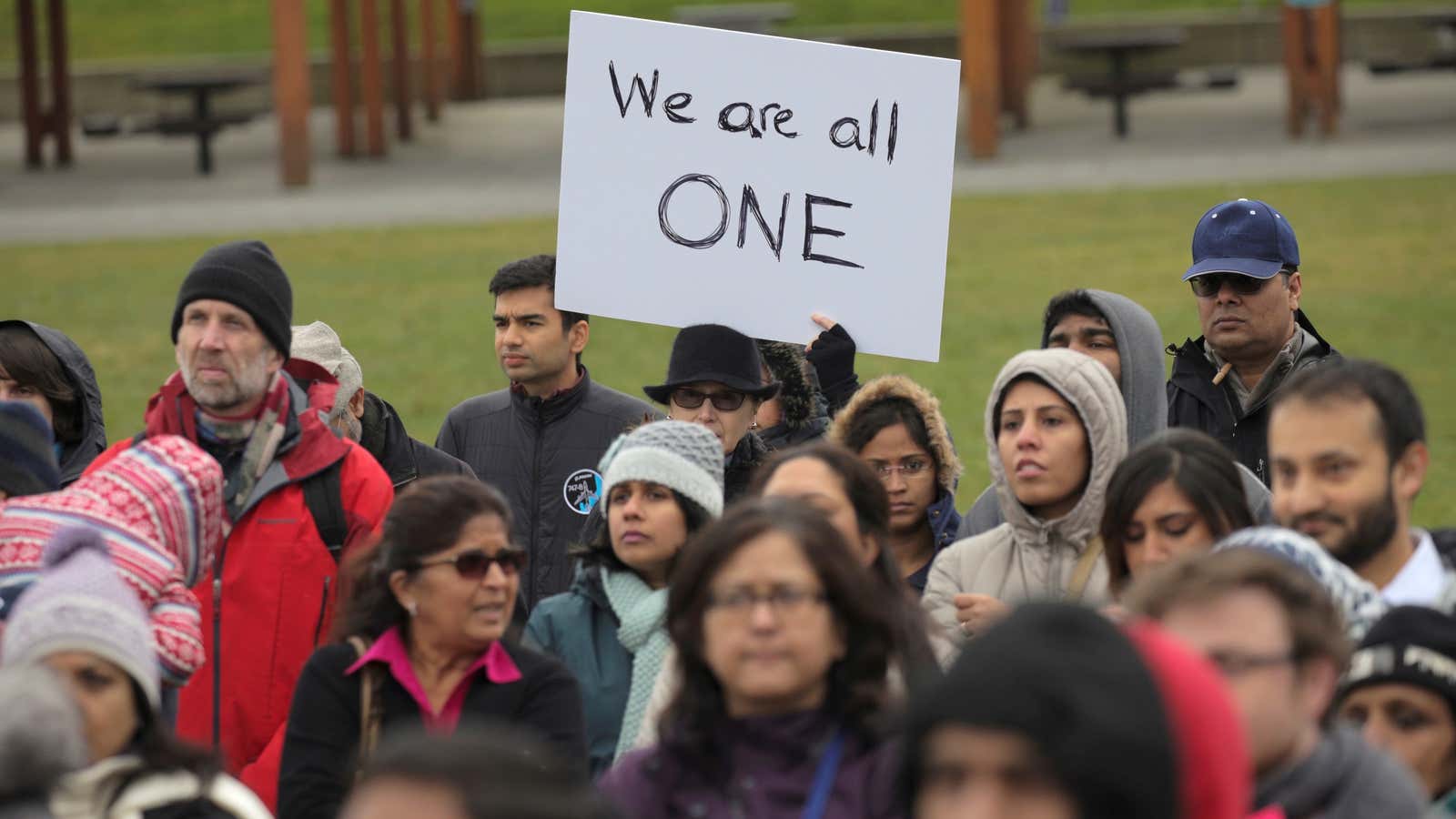Indian engineers with an H-1B visa are facing an unexpected conundrum.
On March 03, the US government temporarily suspended premium processing of the highly sought-after H-1B visa, a category that Indian information technology (IT) outsourcing companies often used to fill up positions in the US from India on short notice. Under this fast-track route, visas are processed in 15 days, instead of the usual three to six months.
Now recruitment experts believe existing H-1B visa holders will be in high demand, landing them a windfall.
However, there’s another side to the story.
Several Indian techies are spooked by the recent incidents of alleged racial violence in the US and are cautious about the locations they are sent to work in.
The windfall
Indian IT outsourcing companies are the biggest beneficiaries of the H-1B and this change in policy means they would now struggle to fill up positions on a short-notice.
At least 20% of all their H-1B applications are processed through the premium route, said Kris Lakshmikanth, chairman of Headhunters India, a boutique executive search firm that works with several Indian IT companies.
Since the premium route will not be available for at least six months now, these companies will have to scramble to fill up positions for new projects. “Tier-I Indian IT services firms largely use the premium processing category for H-1B visa for their employees, since they can easily afford the additional $1,225 fee. But there will be uncertainty, as they will have to wait even for ongoing projects,” Pareekh Jain, senior vice-president at research firm HfS Research, told the Business Standard newspaper. India’s IT trade association Nasscom argues that a more restrictive visa process will end up “hindering access to much-needed talent.”
“If you get a new project, you can’t wait for four to six months to start it. So companies will have to hire H-1B holders from competitors to fill up new positions,” Lakshmikanth of Headhunters India said. “That will come at a high cost now because H-1B holders will be high in demand. Salaries of existing H-1B holders will definitely go up substantially.”
The lure of the existing H-1B worker isn’t new. Transfer applicants don’t have to wait for approval like new ones do; they can start working once the US Citizenship and Immigration Services (USCIS) receives their application.
“The demand for people with valid H-1Bs has always been there because the H-1B lottery is a mess,” 23-year old Rushabh Mehta, a software tools engineer at Apple who got his H-1B in October 2016, says. “Companies always ask if you already have the H-1B approved.”
But existing H-1B visa holders may not be easy to get.
“We are seeing existing H1B visa holders who are very uneasy right now. As a result, companies cannot expect to rely on a talent poaching strategy without serious cost implications,” said Karen Ross, CEO of consultancy firm Sharp Decisions.
Battling racism
The stalling of premium processing is in keeping with Donald Trump’s promise of clamping down on H-1B. But policy changes are only one facet of the worsening landscape: An August 2016 video of a suburban Ohio park shot by anti-immigrant website SaveAmericanITJobs.org has set alarm bells ringing. The video’s description—”Guest workers are not only taking over jobs, but also taking away the real estate and parks”—reflects the unwelcoming sentiment pervading pockets of America today.
In the year leading up to the 2016 elections, non-profit South Asian Americans Leading Together (SAALT) documented 207 incidents of hate violence and xenophobic political rhetoric against South Asian, Muslim, Sikh, Hindu, Arab, and Middle Eastern Americans—a 34% increase from the three-year period covered in the organisation’s 2014 report. A resurgence of white supremacist organisations nationwide, and xenophobic political rhetoric, have led to a spike in racial crimes, SAALT’s January 2017 report, titled “Power, Pain, Potential” shows.
The recent attacks on people of Indian-origin in Kansas and Washington, along with the flurry of mosque-burning incidents, are in many ways emboldened by the ”litany of executive orders and policies,” SAALT’s communications and development manager Vivek Trivedi told Quartz in a statement.
“Just this morning (March 06) my boss told me about an opportunity in Tennessee, but I am not sure if I want to take it up. I have heard it’s not a safe place,” a 34-year-old engineer who works at the Bengaluru office of an American professional services firm said. He holds an H-1B visa that is valid till 2019 and did not wish to be identified because he is not authorised to speak to the media.
“If this opportunity had come up three weeks ago, I would have definitely taken it up because the work they are offering is interesting. But now I am wondering if it’s worth putting my wife and children’s lives at risk,” he added.
